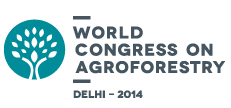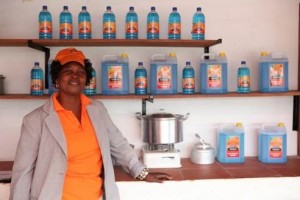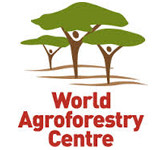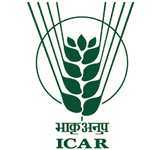
Vigyan Bhavan & Kempinski Ambience
10 - 14 February 2014
Delhi, India
blog

Applying agroforestry solutions to environmental, social and economic problems offers commercial opportunities in developing countries around the globe. This is what Sagun Saxena, Managing Partner of CleanStar Ventures, told the audience during the World Agroforestry Centre (ICRAF) side event “The IFAD-ICRAF Biofuel Program.”
CleanStar’s venture, CleanStar Mozambique, is working proof that it’s possible to increase local food and energy security, reduce vulnerability to climate change, achieve forest protection and reduce greenhouse gas emissions through a smallholder-based agroforestry approach, while simultaneously generating a profit.
CleanStar’s success story was presented during the UNFCCC side event, “The IFAD-ICRAF Biofuel Program” alongside the Bonn Climate Talks. The newly-launched program aims to develop sustainable biofuels – renewable fuels derived from biomass – by capitalizing on the benefits offered by agroforestry, including increased soil fertility, reduced soil erosion, and greater energy yield per unit of land from crops, and by learning from experiences such as Mozambique’s.
In Africa, as in other parts of the world, the use of charcoal as a cooking fuel puts households at risk from indoor air pollution and can contribute to large-scale deforestation if produced unsustainably. In rural areas, unreliable income from charcoal, coupled with a reliance on one or two subsistence crops leaves farmers particularly vulnerable to extreme climatic events. Growing urban populations that depend on imported food products such as Malaysian palm oil and Thai rice are also at risk.
“There’s no connection to the local farmers or to the local agricultural production base,” said Saxena. “And increasingly that means that urban populations are also more vulnerable to shocks related to global food crises.”
CleanStar’s answer to these challenges was an integrated venture that works all the way from agricultural production via smallholder farmers through to supplying the urban population with food and energy products.
blogAt its core, the business transitions subsistence farmers to an agroforestry system that incorporates indigenous and oil-producing trees and includes crop rotation of cassava, cereals and legumes. The increased productivity of cassava generates a sustainable source for the production of an ethanol cooking solution – branded “NDZiLO” or “fire” in the local language – which is sold at or below the price of charcoal. The business also produces packaged, fortified cassava flour and soya cooking oil, both of which help to reduce the reliance on external food imports.
The shift from charcoal to locally-produced renewable fuel allows CleanStar Mozambique to generate certified emissions reductions through the Clean Development Mechanism (CDM). Together, these activities generate revenue for the business, while farmers reap the benefits of increased agricultural productivity, diversified income sources and reduced vulnerability to climate change through a diversity of crops. With roughly 1100 farmers participating to date, the business is set to reach its target of 2000 farmers supplying cassava and 80,000 households using NDZiLO by 2014.
Urban households clearly value this new cooking fuel over biomass. “[Women] want something they can light instantly, they can control the heat of very precisely, they can turn it off and they know it’s off, they’re comfortable for their children and their young daughters to use,” said Saxena.
While the clean cooking movement has focused on liquefied petroleum gas and improved charcoal stoves, Saxena sees a much bigger opportunity. “Our view is that a solution that actually looks at sustainably produced ethanol could have much greater impacts because it makes this really important linkage with farmers.”
“But really the game here is not just about Mozambique,” added Saxena. CleanStar Ventures estimates that there are at least 40 other cities in Africa where similar agroforestry business models could work, along with other continents and especially small island developing states. “Really there’s a much bigger opportunity here about figuring out how to connect urban consumers with these rural households and the smallholder farmers. And the impacts of that in our view can be quite phenomenal.”





